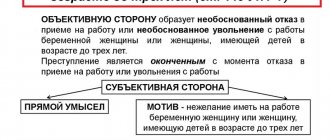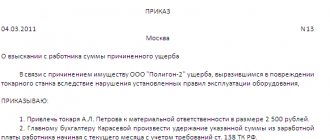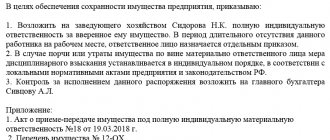Any employee can be held financially liable for damage caused to the employer. But at the same time, the employer is obliged to comply with the conditions and procedure for hiring an employee, since not in all cases the damage is compensated in full.
Very often, shortages in the store, warehouse, or cash register are deducted from the employee’s salary. But an employer cannot always recover damages from its employees without going to court.
In addition, in some cases, the employee may hold the employer financially liable.
To protect their interests, employees must know the grounds, procedure and conditions for bringing them to financial responsibility.
Are you being held financially liable?
Our lawyers will advise you anywhere in Russia. Online consultation in any way convenient for you.
To get a consultation
Types of financial liability
The financial responsibility of the parties to the labor relationship is to compensate each other for the harm caused. The main condition for its occurrence is the infliction of damage as a result of unlawful guilty behavior.
Financial liability is divided into two main types:
- employer to employee;
- employee to the employer.
Employee Responsibility
In turn, the employee’s responsibility may be:
- partial (within the limits of his average earnings),
- complete.
Full financial liability is divided into:
- individual,
- collective.
Careful attitude towards the employer's property, as well as the property of third parties located at the employer, is one of the main responsibilities of the employee (Article 21 of the Labor Code of the Russian Federation). If employees do not fulfill this duty properly and cause damage to the employer, then they are obliged to compensate it.
How does an employee’s financial liability differ from civil liability for harm caused?
- the employee’s financial liability occurs only in the amount of direct actual damage, the employee never compensates for lost income, and within the framework of civil contracts, lost profits are also recovered;
- The amount of damage compensated by an employee, as a general rule, is limited to the amount of his average monthly earnings, and civil liability almost always occurs in full.
All employees bear financial responsibility according to the norms of labor legislation, regardless of the form of ownership of the organization.
Exemption from financial liability for employees and employers under the Labor Code of the Russian Federation
The main document regulating the specifics of exemption from financial liability of an employee and employer is the Labor Code of the Russian Federation. However, the legal regulation of these issues is quite complex, therefore, first of all, one should consider how exactly an employee is exempt from financial liability in the event of various circumstances, and how exactly the employer can avoid its liability to employees.
Thus, exemption from liability can be divided into the following types:
- Unconditional release from liability. If circumstances arise that exclude the employee’s financial liability, he may be released from financial liability completely, regardless of other factors. In addition, an employee or employer is not subject to financial liability without properly filing claims of one of the parties against the other and observing all necessary procedural procedures.
- Partial exemption from financial liability. In some cases, exemption from liability may not imply its complete exclusion and avoidance of the employee’s obligations to the employer and vice versa, but only a partial limitation of the volumes to be recovered. At the same time, there are quite a lot of such situations.
- Exemption from financial liability by agreement or on the initiative of the injured party. The legislation provides for the opportunity for an employer to waive its claims against an employee. However, the employee also has certain mechanisms that allow him not to recover damages from the employer - in this case, liability also does not arise.
Issues related to liability of a material nature are regulated by the provisions of both the Labor Code and, in part, by other regulatory documents.
In particular, a separate procedure is provided for assessing liability in the event of administrative offenses and crimes. Moreover, in the case of assigning financial liability to an employee, it is necessary to take into account its nature - types of material liability imply its division into full and limited. And in the second case, there is a partial release from financial liability.
Given the wide variety and difference in the types and possible grounds for exemption from financial liability of an employee and an employer, each of them should be considered in more detail, because the mechanisms for applying these grounds for exemption from financial liability may differ significantly depending on each specific case.
Partial and full employee responsibility
Limited financial liability means that the employee is obliged to compensate an amount that does not exceed his average monthly salary, regardless of the amount of damage caused.
The amount of average earnings is determined on the basis of Art. 139 of the Labor Code of the Russian Federation and Decree of the Government of the Russian Federation of December 24, 2007 N 922 “On the specifics of the procedure for calculating average wages.” In any mode of operation, the average salary of an employee is calculated based on the salary actually accrued to him for the previous 12 calendar months. The amount of deductions is calculated from the amount remaining after deducting personal income tax (Letter of the Ministry of Health and Social Development of Russia dated November 16, 2011 N 22-2-4852).
Important!
In the case of limited liability, the employer independently withholds funds from the employee’s salary. But he cannot collect the entire salary at once. According to Art. 138 of the Labor Code of the Russian Federation, he cannot withhold more than 20% monthly.
Full financial responsibility
Full liability in the amount of direct actual damage (Part 1 of Article 242 of the Labor Code of the Russian Federation) is assigned to the employee in two cases:
- on the basis of an agreement on full financial liability;
- in accordance with the law.
Cases of full financial liability in accordance with the law are established by Art. 243 Labor Code of the Russian Federation:
- shortage of valuables received by the employee on account or under a contract;
- the damage was caused intentionally or under the influence of alcohol, drugs or other toxic intoxication;
- the damage was caused as a result of an administrative offense or a criminal offense;
- information constituting a secret protected by law (state, official, commercial or other) was disclosed;
- the damage was not caused while the employee was performing his job duties.
The procedure for collecting damages from an employee
To recover damages from an employee, the employer must:
- conduct an inventory of property in the organization and identify lost or damaged property;
-conduct an official investigation to establish the causes of loss or damage to property and the amount of damage;
- demand from the employee written explanations of the reasons for the damage, and in case of refusal, draw up a report;
- determine the amount of damage based on actual losses at market prices on the day the damage was caused (discovered), but not lower than the value of the property according to accounting data (including wear and tear).
Thus, the damage will be recovered from the employee depends on its size, the time that has passed since the amount of damage was established, and the employee’s consent to compensate for the damage:
- if the damage does not exceed the employee’s average monthly earnings, recovery is made on the basis of the employer’s order:
Important! The order can be made no later than one month from the date of final determination by the employer of the amount of damage caused by the employee (Part 1 of Article 248 of the Labor Code of the Russian Federation).
- the employee can voluntarily reimburse it in full or in part; by agreement between the parties, he can be provided with an installment plan, in which case he gives the employer a written commitment indicating specific payment terms.
Important! If an employee who has given a written undertaking has not fully compensated for the damage and wants to resign, the employer does not have the right to prohibit him, and he must go to court for the outstanding debt (Part 4 of Article 248 of the Labor Code of the Russian Federation).
- if the monthly period has expired or the employee does not agree to voluntarily compensate for the damage caused, and the amount of damage exceeds his average monthly earnings, then recovery can only be carried out by the court. The period for filing a lawsuit is one year from the date of discovery of the damage caused.
Important! If there is an agreement on voluntary compensation for damage with installment payment, under which the employee has stopped making payments, the one-year period for going to court is calculated from the moment when the employee was supposed to make the next payment, but did not do so (clause 3, 12 of the Review, approved by the Presidium of the Supreme Court of the Russian Federation on December 5, 2018).
Collective and individual financial responsibility
Full financial responsibility of an employee can be individual or team (collective).
Important! An employer can conclude an agreement on full financial liability with an employee only if the conditions listed in Part 1 of Art. 244 Labor Code of the Russian Federation:
- the employee reaches the age of majority;
- the employee performs functions related to the maintenance of monetary, commodity valuables or other property of the employer (the list of positions and works is approved by Resolution of the Ministry of Labor of Russia dated December 31, 2002 N 85).
The purpose of concluding an agreement on full individual financial liability for shortages of property entrusted to employees directly servicing or using monetary, commodity valuables or other property is to compensate the employer for probable damage in full.
Important! If such an agreement is not signed, then the employer does not have the right to hold the employee liable in full, even if his position is on a special list.
If an employee performs work in which the law allows the conclusion of an agreement with him on full financial responsibility, then the employee does not have the right to refuse to sign it (Letter of the Ministry of Labor of Russia dated November 17, 2020 N 14-2 / OOG-17024). For example, the list includes the following positions: cashiers, collectors, heads of departments of trade, public catering, consumer services, hotels, managers of warehouses, storerooms, pharmacists, heads of library sectors.
The standard form of an agreement on full financial liability was approved by Resolution of the Ministry of Labor of Russia dated December 31, 2002 N 85. It is advisory in nature, but can serve as the basis for concluding such an agreement.
In addition, in some cases, the employer may enter into agreements with employees on collective (team) financial liability (Article 244 of the Labor Code of the Russian Federation), when it is impossible to differentiate the responsibility of each employee for causing harm.
Important! An employer can enter into agreements on full collective responsibility only with employees holding positions or performing work included in the List, approved. Resolution of the Ministry of Labor of Russia dated December 31, 2002 N 85.
The employer's decision to establish full collective (team) financial liability is formalized by order or directive. Members of the team (team) must be familiarized with the document for signature (clause 1 of Appendix No. 4 of Resolution of the Ministry of Labor of Russia dated December 31, 2002 No. 85). The order is attached to the agreement, which is signed by all members of the team (paragraph 2 of clause 1 of Appendix No. 4 of Resolution of the Ministry of Labor of Russia dated December 31, 2002 No. 85).
Important! If the composition of the shift (crew) changes by more than 50%, then the contract must be re-signed. When individual employees leave the workforce and new ones are hired, the contract is not renewed, but the date of his departure is indicated against the signature of the retired team member, and the newly hired employee signs the contract and indicates the date of joining the team (team). This is done to ensure that the new employee is not liable for damage caused to the employer before signing the contract.
If the employer does not comply with the procedure and conditions for concluding an agreement, then the employee may be released from the obligation to compensate for the damage caused through his fault in full in excess of his average monthly earnings (Review of the practice of courts considering cases of employee’s financial liability, approved by the Presidium of the Supreme Court of the Russian Federation 05.12. 2018).
When determining the amount of damage to be compensated by each of the workers, the court must take into account the degree of guilt of each member of the team, the amount of the monthly salary of each of them, the time that each of them actually worked as part of the team for the period from the last inventory to the day the damage was discovered (clause 14 Resolution of the Plenum of the Supreme Court of the Russian Federation dated November 16, 2006 N 52).
With voluntary compensation for damage, the degree of guilt of each team member is determined by agreement between all team members and the employer. If damage is recovered in court, the degree of guilt of each member of the team (team) is determined by the court (Part 4 of Article 245 of the Labor Code of the Russian Federation).

Release of an employee from financial liability for unconditional reasons

- An urgent need. If the damage was directly related to the employee’s actions, performed in order to avoid causing even greater damage or the occurrence of a situation that could lead to catastrophic consequences, regardless of the amount of damage and the nature of the employee’s responsibility, he will be released from it.
- Necessary defense. If damage to the property of the employer or third parties occurred in the process of protecting the employee’s own health from attacks by third parties or other factors, then this damage will not be compensated at his expense. The same applies to situations in which the employee defended the life and health of third parties and in the course of such defense caused damage to any property.
- Normal business risks. In situations where the damage was caused by normal business risks, the employee is released from liability for the damage caused. Normal economic risks mean the possibility of damage to equipment, raw materials or other property during its proper operation without violating the requirements and standards.
- Violation of labor conditions by the employer. If the employer failed to provide adequate conditions for the employee to perform his duties, including not organizing the effective storage of funds and valuables entrusted to the employee and not providing adequate protection for them, the employee is released from financial liability and does not have to compensate for the damage caused to the employer.
- Impact of force majeure. In the event that damage to the property of the enterprise or its clients entrusted to the employee was caused under the influence of insurmountable circumstances - natural disasters, natural or man-made disasters, illegal actions of third parties, the employee will be exempted from financial liability.
In all of the above situations, the employee cannot be held financially liable. It does not matter whether the employee signed an agreement on financial liability or not, whether it is full or limited, whether it is individual or collective.
Who is the financially responsible person?
As has already been said, the employer can enter into individual and collective agreements on full financial liability only with employees of certain categories (The list of positions and work replaced or performed by employees with whom the employer can enter into written agreements on full individual financial liability for shortages of entrusted property is approved by the Resolution Ministry of Labor of Russia dated December 31, 2002 N 85).
Important! The employer does not have the right to enter into written agreements on financial liability if the employee’s position or the specific work entrusted to him is not provided for by the specified List (Article 244 of the Labor Code of the Russian Federation, letter of Rostrud dated October 19, 2006 N 1746-6-1).
In addition, according to paragraph 2, paragraph 36 of the Resolution of the Plenum of the Supreme Court of the Russian Federation dated March 17, 2004 N 2, if the performance of duties for servicing material assets is the main job function of the employee, which was agreed upon when hiring, then refusal to conclude such an agreement should be considered as failure to fulfill labor duties, the employee may be subject to disciplinary action.
If the need to conclude an agreement on full financial responsibility arose after concluding an employment contract with an employee (for example, changes in legislation occurred), and the employee refuses to enter into such an agreement, then the employer, by virtue of Part 3 of Art. 74 of the Labor Code of the Russian Federation is obliged to offer him another job, and in the absence of it or the employee refuses the proposed job, the employment contract is terminated with him in accordance with clause 7 of part 1 of Art. 77 Labor Code of the Russian Federation.
Important! According to Part 2 of Art. 243 of the Labor Code of the Russian Federation, financial responsibility in full can be assigned to the deputy head of the organization or the chief accountant without concluding an agreement on full financial responsibility, but only if this is established by the employment contract.
What to do if the shortfall is calculated from your salary and how to protect yourself
As a rule, an employee who works with money or goods (seller, cashier, pharmacist, waiter, storekeeper) is the financially responsible person.
If there is a shortage at the enterprise and it is deducted from your salary, to determine whether the employer is right, follow the instructions:
- the employer is obliged to comply with the above procedure for bringing to financial liability;
- if the amount of damage recovered from you exceeds your average monthly earnings, then the employer has the right to recover damages only in court, and only if an agreement on full financial liability has been concluded with you (or in the cases specified in Article 243 of the Labor Code of the Russian Federation);
- if the amount of damages being recovered does not exceed the average monthly salary, then the employer has the right to issue an order to withhold wages, but no later than one month from the moment the amount of damage is established, and at the same time no more than 20% of your earnings can be withheld from you.
If these conditions are not met, you have the right to challenge the employer’s decision.
Errors in full liability agreements
A large amount of judicial practice has already developed under these agreements. We have analyzed it and will tell you about the popular mistakes made by employers.
The employee did not participate in the inventory
An employee cannot be found guilty without explanation. The employer must familiarize him with the commission’s conclusion and give him the opportunity to speak out. Otherwise it will turn out to be biased. The court will cancel the penalty, following the Review of Court Practice dated December 5, 2018.
The position is not on the list, but the contract was concluded
You shouldn't rely on intuition. Even if you are sure that the employee must bear full financial responsibility, check the list of the Ministry of Labor. If there is no suitable clause, there is no agreement.
A car mechanic changed the oil on a client's car. He did not tighten the drain plug properly and over time the oil spilled out. The car stopped in the middle of the road because the engine stopped. The car service admitted its guilt and compensated the driver for the costs of calling a tow truck and repairs. And then he began to deal with the employee.
The car mechanic signed an agreement on full financial liability. The entrepreneur filled out the documents and went to court. The court said: neither the position of a mechanic nor car repair work is on the list of the Ministry of Labor. The contract is illegal, so the employee is liable within the limits of his monthly salary.
Case No. 33-4390/2015.
If your employee works with expensive goods, formalize the receipt with one-time documents - deeds and powers of attorney. Then responsibility will also be full under Art. 243 Labor Code of the Russian Federation.
How to protect yourself in case of unjustified prosecution
In case of unjustified holding of material liability, failure to comply with the procedure for collecting damages, or disagreement with the amount of damage, the employee may:
- complain to the labor dispute commission, labor inspectorate or prosecutor's office;
- go to court.
The employee has the right to choose a court at the location of the organization or at his place of residence. You can go to court no later than three months from the moment the labor dispute arises. If the deadline is missed for a good reason, the court will restore it at the request of the plaintiff.
Of course, an important condition for making a decision in favor of employees is the involvement of a competent lawyer, since such disputes have their own specific specifics. An experienced lawyer will help you collect evidence, draw up a statement, and convince the court of unjustified financial liability.
An employee can be held financially liable only if it is proven:
- the presence of direct actual damage;
- illegality of the employee’s actions or inactions;
- the employee’s guilt in the form of intent or negligence;
- causal relationship.
And in case of full financial liability:
- reaching the age of 18;
- existence of grounds (presence of a position or type of work in the list, conclusion of an appropriate agreement or by virtue of a direct indication of the law).
The burden of proving the above circumstances lies with the employer (Appeal ruling of the Sverdlovsk Regional Court dated April 20, 2018 in case No. 33-6731/2018).
Failure to prove one of these circumstances excludes the employee’s financial liability.
As follows from the provisions of Art. 250 of the Labor Code of the Russian Federation, the body for the consideration of labor disputes may, taking into account the degree and form of guilt, the financial situation of the employee and other circumstances, reduce the amount of damage to be recovered from the employee. The amount of damage to be recovered from the employee is not reduced if the damage was caused by a crime committed for personal gain.
Reducing the amount of damage is permissible in cases of both full and limited liability.
For example, in the Appeal ruling of the Sverdlovsk Regional Court dated July 10, 2018 in case No. 33-12040/2018, the court accepted the following as circumstances reducing the amount of financial liability of the employee to the employer: the lack of intent of the defendant to cause harm to the plaintiff’s property, his marital status, place work in a state budgetary institution, the absence of other sources of income, the presence of expenses to pay for correspondence education, the presence of two minor dependent children, an elderly father who suffered a stroke and needs constant care and treatment.
At the same time, the presence of a dependent is not an unconditional basis for reducing the amount of damage, nor is the presence of a loan obligation (Appeal ruling of the Sverdlovsk Regional Court dated November 15, 2017 in case No. 33-19677/2017).
In addition, on the basis of Art. 240 of the Labor Code of the Russian Federation, the employer may refuse to recover damages from the guilty employee, that is, release the employee from a certain property obligation.
The court will also take into account that, according to Art. 239 of the Labor Code of the Russian Federation, the employee’s financial liability is excluded if damage is caused as a result of:
- due to force majeure;
- normal economic risk;
- extreme necessity;
- necessary defense.
- failure by the employer to fulfill the obligation to provide appropriate conditions for storing property entrusted to the employee.
Important!
Failure by the employer to fulfill the obligation to provide adequate conditions for storing property entrusted to the employee may serve as grounds for refusal to satisfy the employer’s demands if this caused damage (Decision of the Supreme Court of the Russian Federation dated December 25, 2017 N 14-КГ17-29).
Release of an employee from financial liability in case of refusal by the employer

Article 240 of the Labor Code provides for the possibility of releasing an employee from liability for damage caused by him if the employer refuses to collect. Moreover, this right is inalienable for this party to the labor relationship. That is, the employer may refuse to withhold compensation from the employee for damage caused, regardless of any other circumstances. This also applies to cases of full liability, as well as partial or limited liability.
To release an employee from liability on this basis, a separate order from the employer is required. The legislation does not provide for a prescribed form for drawing up this document. Therefore, the employer has the right to draw it up in free form. However, in any case, the order must contain the date of preparation, the employer’s signature or seal, a number, as well as an indication of the specific situation according to which the employer refuses to collect compensation from the employee for the damage caused to him.
The right to refuse to recover damages from an employee is only the right of the employer. That is, in accordance with Article 240 of the Labor Code of the Russian Federation, he cannot be forced to take these actions, but can only take this step purely voluntarily. In addition, the employer also has the right not only to completely refuse to recover damages, but also to simply reduce the amount of this recovery depending on his desire.
Disciplinary and financial liability
The current Labor Code of the Russian Federation provides for two main types of independent legal liability related to labor relations. Article 22 of the Labor Code of the Russian Federation directly establishes the right of the employer to bring employees to disciplinary and financial liability in the manner established by the Labor Code of the Russian Federation and other federal laws.
Disciplinary liability is a special type of legal liability. Its content is the measures that the employer takes against an employee who has committed a disciplinary offense.
The employee's financial liability involves compensation to the employer for harm caused by the actions (or inaction) of the employee.
Compensation for damage is made regardless of whether the employee is brought to disciplinary, administrative or criminal liability (Part 6 of Article 248 of the Labor Code of the Russian Federation).
Read about all types of legal liability in the article.
The concept of financial responsibility of the parties to an employment contract. General provisions
Home > About the Center > Tips
: The concept of financial responsibility of the parties to an employment contract. General provisions
The general principle of contract law, which forms the basis of labor relations, is to assign responsibility to each party to the contract
for property damage caused to the other party by non-fulfillment or improper performance by the party of its contractual obligations.
The obligation of the parties to an employment contract to comply with the terms of this agreement is one of the basic principles of labor law (Article 2 of the Labor Code of the Russian Federation, hereinafter referred to as the Labor Code of the Russian Federation). The implementation of the mutual rights and obligations of the parties to the employment contract is ensured (in case of their violation) by liability measures.
Let's agree on terms
Legal liability is the application of state coercive measures to a guilty person for committing an unlawful act.
Material liability in labor law is provided for in Article 232 of the Labor Code of the Russian Federation in the event of damage caused by one party to the other and, therefore, unlike other types of liability, it is the internal liability of the parties to an already existing employment contract.
Historical reference
Currently, the parties to an employment contract are placed in fair conditions when resolving issues of financial liability, whereas previously it was only about the employee’s liability for damage caused to the employer’s property (Articles 118-123 of the Labor Code of the Russian Federation).
The financial liability of the parties to the employment contract - the employer and the employee - is characterized by the following general features:
- The emergence of bilateral financial liability
is determined by the existence of an employment contract; - Its subjects are only the parties to this agreement
; - Liability arises as a result of violation of obligations under an employment contract
; - Each party bears financial liability only for culpable violations
of its duties if this results in
damage to the other party
; - Both parties can compensate for the damage caused voluntarily
; - Rights and obligations regarding financial liability are exercised even after the termination of the employment contract
.
Despite the fact that the financial liability of the parties to an employment contract has common features, it also has strong differences in cases where liability arises for the employee or the employer. This is due to the fact that one party to an employment contract is an individual, and the other is most often a legal entity. They are not equal in their economic and other opportunities. The employer has power and organizational powers in relation to employees, and is always economically stronger than the individual employee; organizes the labor process and therefore bears responsibility for possible adverse consequences; as the owner of the property bears the burden of its maintenance and the risk of accidental death or accidental damage.
These factors determine the differences in the financial responsibility of the parties to the employment contract
:
- If employees, as a general rule, bear limited financial liability, then employers bear full liability;
- The employee does not compensate the employer for lost profits;
- The financial responsibility of employees is differentiated.
The financial liability of the parties to an employment contract may be provided not only by law, but also by the employment contract or an agreement attached to it. At the same time, Part 2 of Article 232 of the Labor Code of the Russian Federation establishes limiting guarantees for the contractual liability of the parties. The employer's responsibility to the employee cannot be lower, and the employee's responsibility to the employer cannot be higher, than is provided for by the Labor Code of the Russian Federation or other federal laws.
Example
This means that in a contractual manner it is impossible to assign full financial responsibility to the employee for the car, machine tool and other equipment that he or she maintains. Such liability is regulated by the relevant norms (Articles 244, 245 of the Labor Code of the Russian Federation), which are not subject to broad interpretation.
At the same time, practice follows the path of establishing, in a contractual manner, additional compensation by the employer for harm caused to the employee’s health in connection with the performance of his job duties. This provision corresponds to Art. 9 of the Labor Code of the Russian Federation, which states that in a contractual manner it is impossible to reduce the level of rights and guarantees of workers established by labor legislation.
The obligation of a party to an employment contract to compensate for damage caused by it to the other party to this contract begins from the date of its occurrence
. In this case, financial liability arises regardless of whether the employee is brought to disciplinary, administrative or criminal liability for this damage (Article 248 of the Labor Code of the Russian Federation), and the employer is brought to administrative liability.
Article 4.1 of the Code of the Russian Federation on Administrative Offenses provides that the imposition of an administrative penalty does not relieve a person from fulfilling his obligation
, for failure to comply with which the punishment was imposed. This rule is important for the financial liability of an employer held administratively liable for labor violations.
note
As a general rule, the mutual rights and obligations of the parties to an employment contract are realized only during the period of its validity, with the exception of the material liability of the parties. According to Part 3 of Art. 232 of the Labor Code of the Russian Federation, termination of an employment contract after causing damage does not relieve its parties from financial liability if the grounds for it arose during the period of validity of the contract.
If the damage (harm) is caused after the termination of the employment contract, then property liability arises according to the norms of civil law.
The Labor Code states that damage caused during the period of validity of the employment contract is compensated in accordance with the norms of the Labor Code of the Russian Federation itself, as well as other federal laws.
When considering property obligations, which include financial liability, first of all, one should take into account the provisions of the Civil Code of the Russian Federation
(hereinafter referred to as the Civil Code of the Russian Federation). Thus, Article 15 of the Civil Code of the Russian Federation gives us a definition of losses subject to compensation, in particular, in the event of damage to property.
Let's agree on terms
In the Civil Code of the Russian Federation, losses are understood as expenses that a person whose right has been violated has made or will have to make to restore the violated right, loss or damage to his property (real damage), as well as lost income that this person would have received under normal conditions of civil circulation , if his right had not been violated (lost profits).
The use of the term “damage” by the Labor Code of the Russian Federation indicates that a party to an employment contract who, through his actions (inaction), caused property damage to the other party,
is obliged to compensate for real damage
, i.e.
expenses incurred by the other party to restore damaged, lost or damaged property. The peculiarity of compensation for damage within the framework of labor relations is that the employee does not compensate the employer for lost profits
.
The financial responsibility of each party to the employment contract is to compensate for the property damage that it caused to the other party. Such liability occurs when the following conditions are simultaneously present:
:
- Presence of property damage
to the injured party; - The illegality
of the action (inaction) that caused the damage; - Guilt
for causing damage; - The cause-and-effect relationship
between unlawful behavior and the resulting damage.
The fact of the existence of property damage and the amount of damage, the illegality of the behavior of the violator of the contract, the causal connection of the damage with the behavior of the perpetrator is proven by the injured party
.
Behavior (action or inaction) is considered illegal if it violates certain obligations imposed on a party to an employment contract by the relevant legal norms. The main duties of the employee are provided for in Art. 21 of the Labor Code of the Russian Federation, and in addition may be assigned to him by internal regulations, employment contract, instructions of the employer. The employer's responsibilities are determined by Art. 22 Labor Code of the Russian Federation.
The fault of each side
possible in the form of intent, which is rare in labor relations, and negligence.
Any form of fault is sufficient
to establish liability, but the amount of damages awarded usually depends on whether the fault is willful or reckless. In labor legislation there is no general formulation of recognizing a party as innocent.
This formulation, in relation to the fulfillment of civil obligations, is contained in clause 1 of Article 401 of the Civil Code of the Russian Federation and can be applied to labor relations: a person - an employee or an employer - is declared innocent
, if, with the degree of care and prudence required of him by the nature of the obligation, he
took all measures for the proper performance of the obligation and the prevention of damage
. In cases provided for by special laws, compensation for damage is made regardless of the employer’s fault.
Example
Article 59 of the Merchant Shipping Code of the Russian Federation provides that in the event of the loss of property of a ship's crew member or damage to such property as a result of an accident with the ship, the shipowner is obliged to compensate the ship's crew member for the damage caused. Damage caused to the property of a crew member of a ship who is guilty of an accident with the ship is not subject to compensation. A similar rule is contained in Art. 28 of the Code of Inland Water Transport of the Russian Federation: any member of the ship’s crew has the right to transport property intended for personal use on the ship. In the event of loss or damage to such property as a result of an accident with the ship, the shipowner must compensate the crew member for the damage caused.
Thus, both in the merchant marine fleet and on inland water navigation vessels, the obligation of the shipowner-employer to compensate for damage caused to the property of an employee - a member of the ship’s crew - arises even in the absence of his guilt in causing the damage.
A causal connection
between the actions of one of the parties to the employment contract and the resulting damage means that the damage did not occur by chance, but was a consequence of specific actions (or inaction).
For accidental consequences,
the parties to the employment contract do not bear financial responsibility. Causality is established by the court on the basis of evidence presented by the parties.
Article 233 of the Labor Code of the Russian Federation, after listing the named conditions for the material liability of the parties to the employment contract, says: “unless otherwise provided by this Code or other federal laws.” This clause is important for protecting the material interests of the employee when damage is caused to him by a source of increased danger
(a moving vehicle, high voltage electrical energy, etc.), which
the employer legally owns
(for example, on the right of ownership, the right of economic management or operational management, the right of lease).
According to Article 1079 of the Civil Code of the Russian Federation, the owner of a source of increased danger is obliged to compensate for the damage caused by this source unless he proves that the damage arose as a result of force majeure or the intent of the victim. It follows from this that the employer-owner of a source of increased danger is liable for harm caused to employees by this source even in the absence of his own fault
.
Fedorova E.E., labor law expert, teacher of personnel courses.
HR courses for beginners and professionals
Home > About the Center > Tips
Financial liability of a former employee
Termination of an employment contract does not relieve the employee from the obligation to fully compensate for the damage. In this case, damages are recovered in court.
But in order to recover damages from an employee after termination of an employment contract, the employer must comply with the established procedure for bringing financial liability during the employee’s work. The court will check this, and if the procedure was violated, then it will not be possible to recover damages in court from the former employee.









